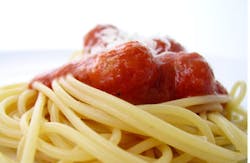Tests show horse DNA in spaghetti bolognese meatballs
British supermarket chain Tesco said on Monday that the tests it had carried out on its own-brand frozen spaghetti bolognese products, which were pulled from store shelves last Wednesday, were positive for horse DNA.
In the withdrawn meals containing horse DNA, the trace level of most was less than 1%. However, three tests showed a significant presence of horse DNA, exceeding 60%.
The retailer said that all its tests were negative for the potentially harmful veterinary drug bute, which is banned from the human food chain because it may cause a type of leukemia.
The announcement is just one of the latest to hit the headlines in the horsemeat scandal that has rocked the UK's food industry and reverberated across Europe as a complex supply chain emerged. The scandal first erupted after beef products sold in some of the major supermarkets in Britain and fast-food chain Burger King were found to contain horsemeat, leading to a number of tests and thorough investigations into suppliers.
RELATED: Irish horsemeat-in-hamburger scandal continues to unfold
Tesco has already abandoned an Irish supplier after its frozen beef burgers showed the presence of horsemeat.
Tesco withdrew its frozen Everyday Value Spaghetti Bolognese meals last week as a precautionary measure after frozen food company Findus pulled its beef products following the advice of its French supplier Comigel, which also supplies to Tesco. Findus said last week that horsemeat had been found in some of its beef lasagna products.
While the relevant authorities are still investigating the source of the horsemeat, the level of contamination suggests that Comigel had not observed the right production process for Tesco products and Tesco will not take food from Comigel's facility again, the British retailer said.
Tesco apologized for letting its customers down and for the recent cases in which it had not met the high standards it had set itself for the food it sells.
The Food Standards Agency (FSA) has ordered food companies to check for horsemeat in all processed beef products, including burgers, meatballs and lasagna, with the first results due on 15 February. The agency said that all horse carcasses in Britain have been tested for bute since the end of January. It has also ordered Findus to test its horsemeat positive lasagna products for bute.
Meanwhile, Environment Secretary Owen Paterson has been criticized by the opposition Labour Party over the slow testing of beef products, which is taking up to 10 weeks, while Shadow Environment Secretary Mary Creagh called for stricter passport registration and microchipping of horses that enter slaughterhouses to ensure that no harmful elements enter food products. A former FSA scientist has linked the horsemeat crisis to a European Union decision to reclassify a type of minced meat widely used in Britain.
